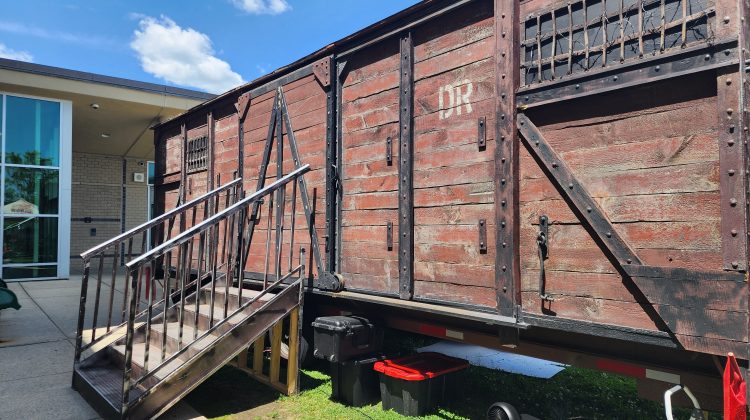LYNN — The Hate Ends Now Mobile Holocaust Exhibit and Original Artifacts Collection came to the city, providing 10th-grade students at Lynn Classical with an up-close look at two survivors’ stories.
The exhibit is located inside a former movie-prop cattle car. Lynn Classical history teacher Charles Orrell said that before World War II, these cars were used solely to transport livestock. During the war, the cars were used to transport Jewish people to concentration camps and death camps.
Orrell said the cars usually held 100 to 150 people, with a bucket of water and a bucket for people to use the bathroom.
“They were packed in, quite literally, like sardines. We had 20 kids in at a time, and it felt very cramped and we had plenty of personal space to move around,” Orrell said. “95% of these people who got off these train cars were dead within an hour and a half, and the rest were put in as slave labor.”
Orrell said that many people would die in the cars due to the horrific conditions and could not fall down due to the congestion of people there.
The exhibit tells the story of two Holocaust survivors, who are now 94 and 96 years old.
“It’s a video that depicts the stories of two Holocaust survivors, who are still alive today,” Orrell said. “(The exhibit) tells their story of being put on one of these train cars and headed into Poland, which is where all five of the death camps were, but somehow survived it.”
Kristen Tabacco, assistant director of curriculum and instruction for the city’s school district, said that she found out about the exhibit from Salem State University’s newsletter.
She was able to fund the two-day experience at Classical with funds from the Genocide Education Grant the district applies for every year through the Department of Elementary and Secondary Education.
“It’s only a part of what we do with the genocide grant,” Tabacco said.
As part of the district’s effort to provide more education pertaining to genocide, Tabacco said it is adding a new elective class, Global Genocide, to the course list in the high schools.
Tabacco and Orrell both said learning about past genocides, like the Holocaust, is incredibly important, as most survivors are no longer living.
The organization Hate Ends Now works to educate current generations on the atrocities of the past, in order to help prevent them from happening in the future.

